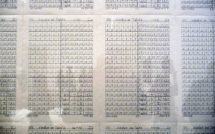

This is part of our Campus Spotlight on Princeton University.
Course description
When we think about the past, we contemplate “history,” and this in turn compels us to talk about “events” and assign them to a given “decade” or “century”—all of these, upon reflection, being hardly straightforward terms or processes. Likewise, if we describe the past as “the Renaissance” or “the modern,” we take on a raft of complications owing to the vexed histories of these terms’ formation. This is how it is. In this course, we choose the equally difficult concept of the “premodern” to designate a period in, and a form of, the past while opening each of its terms, “pre” and “modern,” to critical examination. What is “the modern” (or modernity, or modernism) that “the premodern” precedes; or, rather, how do different forms of “the modern” produce different “premoderns”? How does “the premodern” relate to other ways of imagining the Other of the modern (e.g., ancient, medieval, classical)? Does the “premodern” productively elide differences between the ancient and the medieval, or only subordinate them both to “the modern”? How should we understand the force of the “pre” in “the premodern”? Does it require linearity or teleology? The alterity of the premodern past to an “us” now? How can we speak of the (premodern) past if it persists in the present or is the basis for the future?
Reading schedule
Week 1
Lefebvre, Henri. 2011 [1962]. “What is Modernity?” In Introduction to Modernity: Twelve Preludes – September 1959 – May 1961. Brooklyn, NY: Verso.
Week 2
Jameson, Fredric. 2002. “Preface” and “The Four Maxims of Modernity.” In A Singular Modernity: Essay on the Ontology of the Present. Brooklyn, NY: Verso.
Week 3
Foucault, Michel. 1990. [1976.] History of Sexuality, Vol. 1. New York, NY: Vintage. (Parts 1 & 5)
Latour, Bruno. 1993. [1991.] “Introduction.” In We Have Never Been Modern. Cambridge, MA: Harvard UP.
Week 4
Fabian, Johannes. 2014. Time and the Other: How Anthropology Makes its Object. New York, NY: Columbia UP. (Ch. 1-3, Conclusion).
Chakrabarty, Dipesh. 2008. Provincializing Europe: Postcolonial Thought and Historical Difference. Princeton, NJ: Princeton UP. (Part 1, Epilogue).
Week 5
Hegel, Georg Wilhelm Friedrich. 1977 [1807.] Phenomenology of Spirit. Oxford, UK: Oxford UP. (Sections on Lord/Bondsman & Antigone).
Week 6
Lucretius. 2007. The Nature of Things. London, UK: Penguin Publishing.
Serres, Michel and Bruno Latour. 1995. “Second Conversation.” In Conversations on Science, Culture, and Time. Ann Arbor, MI: University of Michigan Press.
Serres, Michel. 2001. [1977]. “Return to the Model,” and “Turba, Turbo.” In The Birth of Physics. New York, NY: Rowman & Littlefield.
Week 7
Norman, Larry F. 2011. The Shock of the Ancient. Chicago, IL: University of Chicago Press.
Harloe, Katherine. 2013. Winckelmann and the Invention of Antiquity: History and Aesthetics in the Age of Altertumswissenschaft. Oxford, UK: Oxford, UP.
Porter, James. 2005. “What is ‘Classical’ about Classical Antiquity? Eight Propositions. Arion 13, no. 1 (Spring/Summer): 27-61.
Settis, Salvatore. 2006. The Future of the Classical. Cambridge, UK: Polity Press.
Week 8
Mayer, Arno J. 2010. The Persistence of the Old Regime: Europe to the Great War. Brooklyn, NY: Verso. (Excerpts.)
Sharma, R.S. 1984. “How Feudal was Indian Feudalism?” Social Scientist 12, no. 2: 16-41.
Dirlik, Arif. 1985. “The Universalisation of a Concept: ‘Feudalism’ to ‘Feudalism’ in Chinese Marxist Historiography.” The Journal of Peasant Studies 12, no. 2-3: 197-227.
Banaji, Jairus. 1977. “Modes of Production in a Materialist Conception of History.” Capital & Class 1, no. 3: 1-44.
Orren, Karen. 1992. Belated Feudalism: Labor, Law, and Liberal Development in the United States. Cambridge, UK: Cambridge UP.
Stuurman, Siep. 1993. (Book Review) “Karen Orren. Belated Feudalism: Labor, Law, and Liberal Development in the United States. Cambridge University Press, Cambridge, ‘etc.’ 1991. X, 238 pp. £12.95; $15.95.” International Review of Social History 38, no. 3: 381-385.
Week 9
Nietzsche, Friederich. 1997. “On the Uses and Disadvantages of History for Life.” In Untimely Meditations. Cambridge, UK: Cambridge UP.
Leonard, Miriam. 2015. Tragic Modernities. Cambridge, MA: Harvard UP. (Ch. 1)
Porter, James. 2019. “Nietzsche’s Untimely Antiquity.” In The New Cambridge Companion to Nietzsche. Edited by Tom Stern. Cambridge, UK: Cambridge UP.
Week 10
Freedman, Paul and Gabrielle M. and Spiegel. 1998. “Medievalisms Old and New: The Rediscovery of Alterity in North American Medieval Studies.” The American Historical Review 103, no. 3: 677-704.
Aers, David. 1992. “Whisper in the Ear of Early Modernists; or, Reflections on Literary Critics Writing the History of the Subject.” Culture and History 135, no. 1600: 177-202.
Biddick, Kathleen. 1998. The Shock of Medievalism. Durham, NC: Duke UP. (pp. 3-12)
Watson, Nicholas. 1999. “Desire for the Past.” Studies in the Age of Chaucer 21: 59-97.
Week 11
Didi-Hubermann, Georges, Vivian Rehberg, and Boris Belay. “Artistic Survival: Panofsky vs. Warburg and the Exorcism of Impure Time.” Common Knowledge 9, no. 2: 273-285.
Nagel, Alexander and Christopher S. Wood. 2010. Anachronic Renaissance. Princeton, NJ: Princeton UP. (Excerpts)
Nagel, Alexander. 2012. Medieval Modern: Art out of Time. London, UK: Thames & Hudson. (Ch. 1-3)
Week 12
Goldberg, Jonathan and Madhavi Menon. 2005. “Queering History.” PMLA 120, no. 5: 1608–17.
Dinshaw, Carolyn. 1999. Getting Medieval: Sexualities and Communities, Pre- and Postmodern. Durham, NC: Duke UP. (Excerpts)
Sharpe, Christina. 2016. In the Wake: On Blackness and Being. Durham, NC: Duke UP. (Ch. 2)
Best, Stephen. 2018. None Like Us: Blackness, Belonging, Aesthetic Life. Durham, NC: Duke UP. (Ch. 1-2).
Andrew Cole is the Wilson Professor of Literature and Director of the Gauss Seminars in Criticism at Princeton University. He is the author of The Birth of Theory (2014) and Literature and Heresy in the Age of Chaucer (2008). His writing has appeared in Artforum, PMLA, October, Representations, and Critical Inquiry, among other journals. He was awarded a Guggenheim Fellowship in 2014.
Brooke Holmes is the Susan Dod Brown Professor of Classics at Princeton University. She is the author of The Symptom and the Subject: The Emergence of the Physical Body in Ancient Greece (2010) and Gender: Antiquity and its Legacy (2012). She has also co-edited four essay collections and was awarded a Guggenheim Fellowship in 2018.




